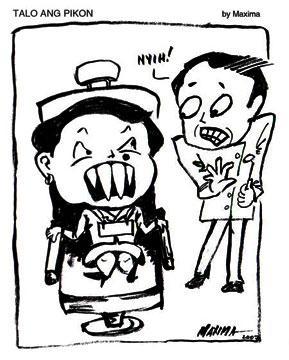From 2001 to 2006
Macapagal-Arroyo
Responsible for Worst-Ever Fiscal Crisis – IBON
The administration of
President Gloria Macapagal-Arroyo is the most indebted in Philippine
history, as well as among the most heavily indebted in East Asia.
BY IBON FOUNDATION
Posted by Bulatlat
 In her response to a
survey that found the Philippines to be the most corrupt economy in Asia,
President Gloria Macapagal-Arroyo claimed that the country’s negative
image was an offshoot of tough decisions she made to turn the country
around, such as the implementation of the reformed value-added tax (RVAT)
which was one of the administration’s tax reform measures.
In her response to a
survey that found the Philippines to be the most corrupt economy in Asia,
President Gloria Macapagal-Arroyo claimed that the country’s negative
image was an offshoot of tough decisions she made to turn the country
around, such as the implementation of the reformed value-added tax (RVAT)
which was one of the administration’s tax reform measures.
An examination of her
six-year record in office, however, showed that her administration
actually brought the country to its worst-ever fiscal crisis, according to
independent think-tank IBON Foundation.
IBON Research Head
Sonny Africa said that total national government debt stood at P3.91
trillion ($81.07 billion, based on an exchange rate of P48.28 per US
dollar) in October 2006. On the other hand, total public sector debt
(including debt of government corporations and other government entities)
reached P6 trillion ($124.27 billion) which is equivalent to some 110% of
the gross domestic product (GDP).
Africa added that
these figures do not yet include contingent liabilities (or
government-guaranteed debt) of P552.7 billion ($11.45 billion) as of
September 2006. The Macapagal-Arroyo administration is the most indebted
in Philippine history, as well as among the most heavily indebted in East
Asia.
Hence, total debt
service allocations in the national budget have increased 186 percent from
P274 billion ($5.68 billion) in 2001 to P784 billion ($16.24 billion) in
just the first 11 months of 2006, Africa said. In real terms (taking
inflation and population growth into account), he added, every Filipino
now owes the country’s creditors some P9,015 ($186.72).
According to Africa,
it should not be surprising that Arroyo was forced to implement the RVAT,
the most regressive tax of all, which generated P76.9 billion ($1.59
billion) in net revenues last year, mostly taken from the pockets of
ordinary consumers.
He said that Arroyo
failed to point out that she also made drastic cuts in allocations for
social services to make these high and rising debt payments. Real spending
per capita on education of P1,506 ($31.19) in 2006 is 22 percent lower
than in 2001. The same can be said for health (P159 or $3.29, 25 percent
lower) and social security, welfare and employment (P532 or $11.02, nine
percent lower).
Government’s neglect
of education, coupled with worsening economic and social conditions, means
that millions of children are unable to obtain decent schooling. Out of
every 100 children who enter Grade 1, only 66 percent finish elementary
school, 43% high school and 14% graduate from college.
In 2006, some 2.5
million children aged 5 to 17 had to work either to augment family income
or merely to survive. Over three-fourths of these children worked as
laborers and unskilled workers in psychologically and physically hazardous
conditions.
No amount of hype
about economic gains can therefore hide the worsening state of the
people’s welfare under the Macapagal-Arroyo administration, Africa said.
Posted by Bulatlat
BACK TO
TOP ■
PRINTER-FRIENDLY VERSION ■
COMMENT
© 2007 Bulatlat
■
Alipato Publications
Permission is granted to reprint or redistribute this article, provided
its author/s and Bulatlat are properly credited and notified.